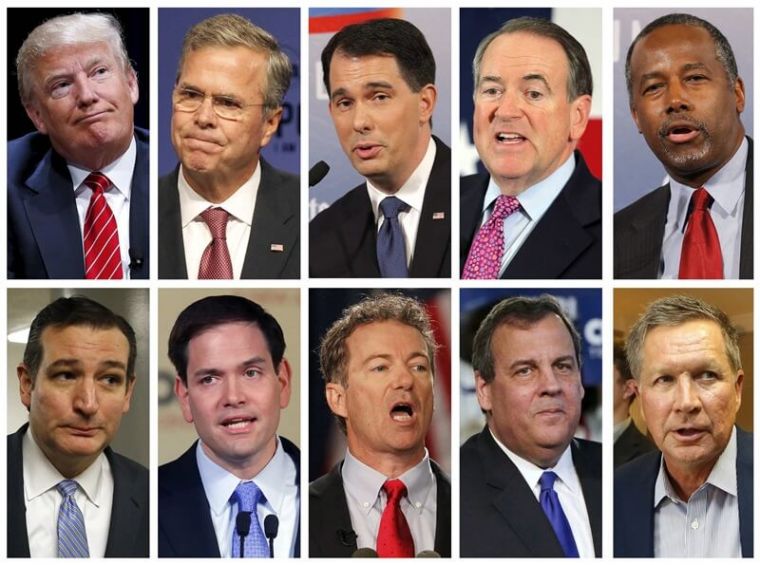Donald Trump leads 9 other GOP hopefuls in first prime-time TV presidential debate

Fiery real estate mogul Donald Trump will be leading 10 candidates in the highly anticipated first television debate among Republican presidential aspirants, which is deemed crucial for next year's GOP presidential nomination.
Trump secured the top spot in the debate after earning an average of 23.4 percent support in five national polls conducted, according to Fox News, which will be hosting the debate set on Thursday evening in Cleveland, Ohio.
Former Florida Gov. Jeb Bush was ranked second in the debate, after garnering an average of 12 percent support.
Wisconsin Gov. Scott Walker will be the third participant with 10.2 percent support, followed by Arkansas Gov. Mike Huckabee with 6.6 percent, and retired neurosurgeon Ben Carson with 5.8 percent.
Texas Gov. Ted Cruz (5.4 percent), Florida Sen. Marco Rubio (5.4 percent), Kentucky Sen. Rand Paul (4.8 percent), New Jersey Gov. Chris Christie (3.4 percent) and Ohio Gov. John Kasich (3.2 percent) will also join the prime-time debates.
"As governor, I am glad to welcome my fellow debate participants to our great state and I look forward to discussing the issues facing our country with them on Thursday," Kasich said in a statement, according to Fox.
The remaining Republican presidential aspirants will also take part in a debate but on an earlier time slot preceding the main event. Participating in this debate are former Texas Gov. Rick Perry (1.8 percent), Pennsylvania Sen. Rick Santorum (1.4 percent), Louisiana Gov. Bobby Jindal (1.4 percent), former business executive Carly Fiorina (1.3 percent), South Carolina Sen. Lindsey Graham (0.7 percent), New York Gov. George Pataki (0.6 percent) and former Virginia Gov. Jim Gilmore (0.2 percent)
Republican strategists said those who will fail at the debate could be left to languish without political oxygen and be de-legitimised by donors and early endorsers, according to CNN.
In a move supported by the Republican National Committee (RNC), Fox used national polling data to divide the candidates into two groups, arguing that putting them all together in one stage could lead to an unwieldy event.
The decision relegated Perry and Santorum to the lower-tier debate.
Santorum spokesman Matt Beynon assailed both Fox and the RNC for an "incredibly flawed" process in selecting the debate participants. "They should not be picking winners and losers," he said. "That's the job of the voters, particularly those in Iowa and New Hampshire who have the role of voting first."
Perry appeared unperturbed. "I look forward to being @FoxNews 5pm debate for what will be a serious exchange of ideas & positive solutions to get America back on track," he tweeted on Tuesday afternoon.
For months, Republican candidates at the bottom of the pack have been employing aggressive tactics to catch up with the leaders in national opinion surveys.
Recently, Perry and Graham came up with attention-grabbing strategies in hopes of gaining publicity and polling numbers.











